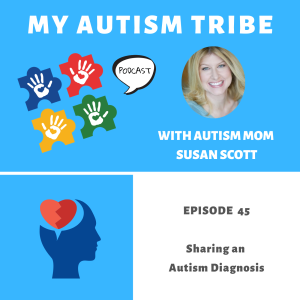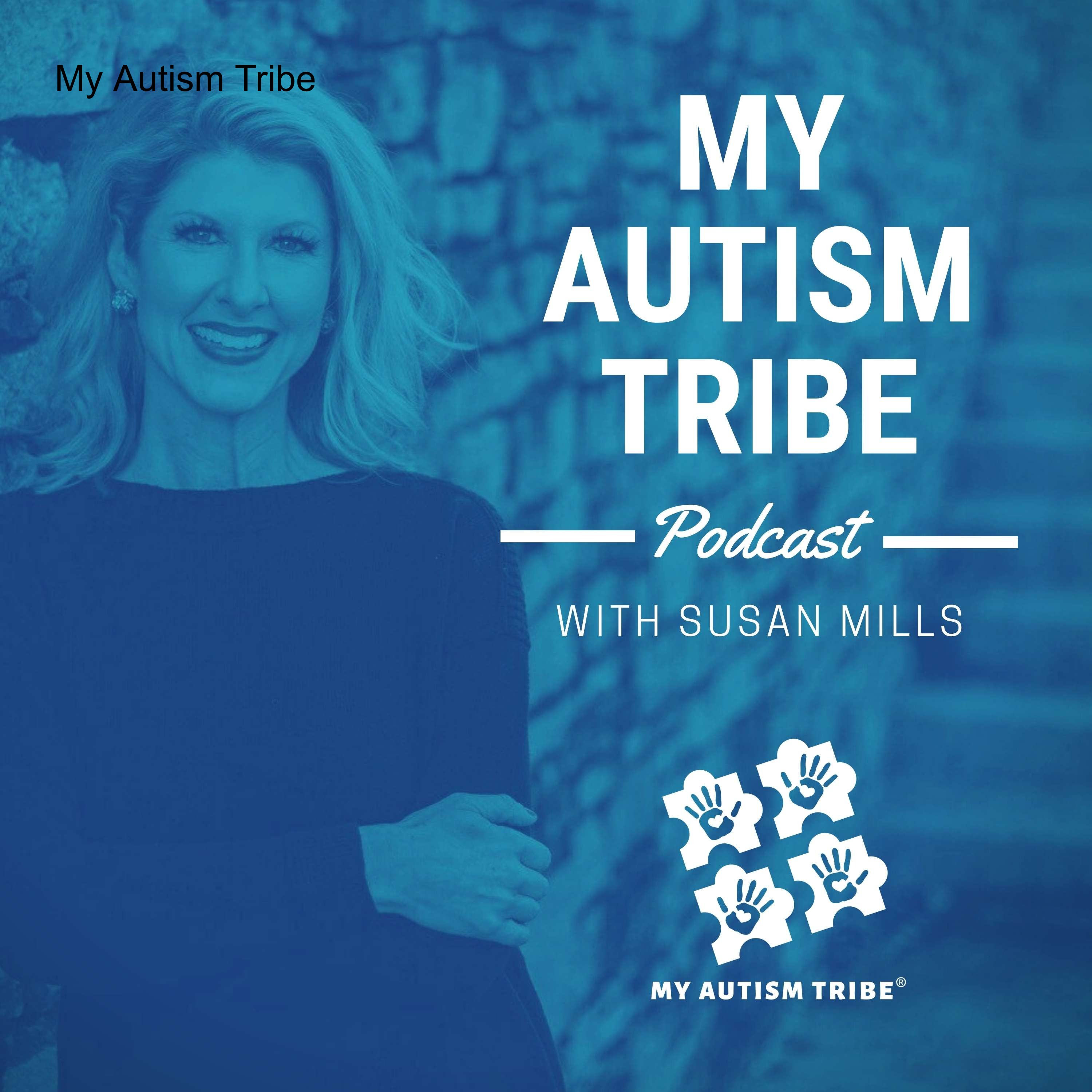Episodes

Monday Dec 02, 2019
Sharing an Autism Diagnosis
Monday Dec 02, 2019
Monday Dec 02, 2019
EPISODE 45: SHARING AN AUTISM DIAGNOSIS
INTRO:
Hello, Friends! Thanks for joining me. This is the last podcast for the 2019 season. I want to take this time to thank each and every one of you for an amazing ride in 2019 – the first official year of this podcast and the My Autism Tribe nonprofit organization. I’m really excited about all of the advocacy plans that we already have for 2020…I’ll give you a hint on a couple: plans for a residential autism community, and an entire children’s book series. Buckle up for a wild and exciting year. As we finish out this year, I thought it would be fitting to take a podcast break before we start our second season. This time is going to be used to soak in every minute with family during the holidays. I want you to do the same. Don’t worry, we’ll still be on our social platforms, encouraging, empowering and supporting our friends. And without further ado, let’s get started with this podcast. It’s a solo episode and I’m talking about receiving an autism diagnosis, and sharing this diagnosis with family, friends, coworkers, really anyone that is involved in you or your child’s life. I’ll also share some tips that I’ve learned from personal experience, in addition to tips that others have shared.
And you’re enjoying this podcast, we kindly request that you rate and review us wherever you listen to podcasts, and share with a friend. That’s how we make our voice stronger. Thanks for listening!
SEGMENT:
One thing is certain, any kind of diagnosis received, whether for yourself, your child, another family member, or friend, can and will lead to questions. Three and a half years ago, my son received his autism diagnosis, and I wasn’t prepared for what followed. As many of you know, you’re immediately thrown into the unknown world jam-packed and overloaded with libraries of information – whether you want to be or not. It’s part of it. Plain and simple. The days that follow can be some pretty dark ones. As you’re wrapping your head around the very definition of autism, which let’s face it, is a pretty loose one…it’s a SPECTRUM, right? You’re asking doctors questions, asking yourself questions, and then…people start asking YOU questions. Questions that, I guarantee, you aren’t prepared for. YOU are only in the beginning stages of answering questions that you have.
I wasn’t sure how to answer most of them, and to be honest, my son’s diagnosis wasn’t something that I was even comfortable sharing with others until I had taken the time to process it. I’ve spoken with many individuals on the spectrum, heard their stories on receiving the diagnosis (sometimes much later in life), heard stories from parents on their child’s diagnosis, and all of them have had different journeys, but they also share many similarities. The most common similarity being that it was just flat out challenging to explain autism to their family and friends. And they were even undecided initially if they should say anything at all. I get it – and I bet most of you all do, too.
Autism is definitely something that people are becoming more aware of, but just as you were in the early stages of diagnosis, they may have a limited understanding of what it looks like. And there’s a lot of misinformation out there as well that has skewed people’s perceptions. Media has recently helped with overall awareness – characters being written in to scripts for films and television shows, even times with the lead character being on the spectrum. But conversations can inevitably have Rain Man throwbacks, and questions of certain savant qualities. We all know these responses to the stereotypes of what autism is, and that maybe your child doesn’t fit in that box.
A little sidebar, by the way. You’ll hear me reference “your child” throughout this, and I apologize in advance. I know there are many listeners that don’t have a child on the spectrum. Maybe they themselves are on the spectrum, or their grandchild or co-worker’s friend. I’m only speaking from the “your child” perspective because this is from my viewpoint as a parent, but this discussion may be used across the board, so to speak.
Ok, so where were we? Sharing an autism diagnosis. It’s a conversation that is likely to be difficult and most certainly emotional, but just know that through this conversation, you will begin healing AND getting your tribe in order. It’s really important to have the people that you are close to as allies, because they are just as important as you are in advocating. The whole saying “it takes a village” is true. It takes your tribe.
You may be told that you are overreacting, and children develop at different paces. That’s true. People may say that just because your child is a little different doesn’t mean he or she needs a diagnosis. That’s true. But you know your child better than anyone, and there are likely some challenges they are having that are not visible to everyone in your family – only known to your eyes and your heart. So, let’s talk about some of the ways that you can better equip yourself and others for this conversation.
The first question that I often heard was, “Autism diagnosis. So, what does that mean?” It’s a pretty loaded question for a spectrum diagnosis. I usually start with explaining the behaviors, instead of pulling out statistics and handing out pamphlets of information. My son, as an example, had a hard time transitioning from one thing to another, one place to another, and had extremely limited eye contact…at least initially. I explained these challenges as being a part of the spectrum…at least for him.
After using examples of some of his behaviors, I would then segway into some of the “basics”, like social skills and restricted or repetitive behaviors. Because of his lack of eye contact, as an example, my son might not respond in ways that a typically developing child would. He had a severe speech delay, and with his lack of eye contact, social situations were difficult. He also has a restricted diet, so if we went to a birthday party of a social event, when other children were eating pizza my son may be eating Chex Mix. Vocal stims may be a part of everyday life, or wanting to talk for hours on end about dinosaurs.
Autism is a spectrum, so explaining to them that not all people exhibit these behaviors, but these are some common ones. This may not fit their stereotype of what autism is, so you might be met with some resistance. I didn’t have this experience of resistance (at least nothing major), but I’ve heard from families where even immediate family members struggled to understand, to accept, and to move on. Give them time to process. Just like you are processing, they need to as well. Just like you may have had feelings of sadness, anger, frustration – they could be finding a way to make sense of it. This may take a lot longer for some people, but be patient. They’ll find their way. In the meantime, ask them if they will support your child, because they are important. Diagnosis or not, your child deserves to be loved unconditionally. I’ve even heard of some family members (immediate and extended) being involved with doctor visits. It has helped them understand a little more about what is going on, and how they can support.
Many people ask why a diagnosis is even needed – that you don’t need to put a label on your child. Well, I never wanted to label my child, but apparently insurance companies do. Without a diagnosis, my son wouldn’t have had the services he has had…the services that has allowed him to reach his potential. If it takes a label (a diagnosis), then so be it. I’ve also never whispered the word “autism”, afraid that it might hurt my son’s feelings. I’ve actually spoken of it as a super power of sorts. Through truth and understanding, I feel like my child has become stronger, and in turn can be stronger for others that may not be. That’s just a choice that I made in our journey.
Another question, that I still fear years later, is “what caused it”? Uuuuuuugh. I can’t tell you just how much I hate this. There are SO many studies, SO many opinions, that it’s even a difficult topic of conversation within the autism community itself. Short story is – they don’t know. A slightly more expanded version is – it’s a neurodevelopmental disability, and it’s not caused by bad parenting. Maybe I’m still a little sensitive to this question due to the fact that I spent a whole year after receiving my son’s diagnosis researching on ways to blame myself, and I never want others to feel this way. I wish that I had known then what I know now. I’ve heard from others that they wish they had taken some time away from the internet, because just as the internet gives us so much valuable information, there’s a lot of guck out there as well. The fact is, I love my son, with or without a diagnosis, with or without a reasoning for what causes autism. He’s beautiful, and so, so special.
No matter how you share an autism diagnosis, make sure you find your people that “get it”. The people that need no explanation, but rather a want to help support you and your family. Sometimes, it might not be family members. Sometimes it’s those strangers that you meet along that way that will give you the largest support. People like you. I’ve had the pleasure and privilege of making so many friends through My Autism Tribe and this podcast. My son is what keeps me going, but you are also what keeps me going, and I hope that I’m helping support you. We’re in it together, one voice made stronger. Much love to you all. Thanks for being a part of My Autism Tribe, and I’ll see you…next year, in 2020!


No comments yet. Be the first to say something!